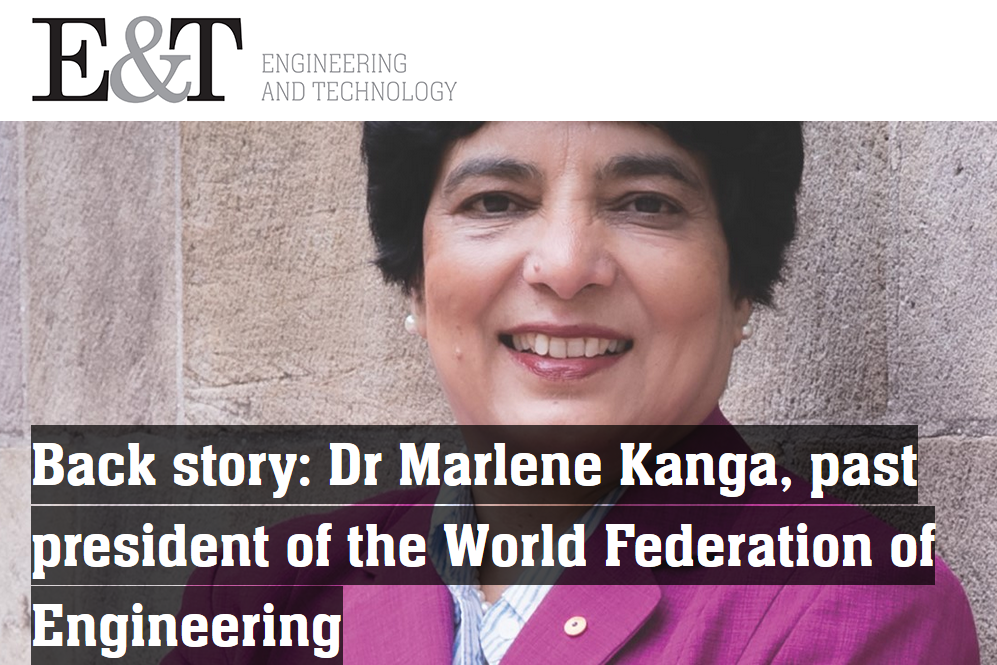
TV presenter Dr Shini Somara talks to Australian engineer, Dr Marlene Kanga, immediate past president of the World Federation of Engineering Organisations and a keen advocate for encouraging diverse and inclusive groups in the engineering world.
Australian engineer Dr Marlene Kanga, AM FTSE HonFIEAust HonFIChemE, is the immediate past president of the World Federation of Engineering Organisations (WFEO) representing 100 nations and some 30 million engineers. With a background in chemical engineering, she is now a keen advocate for the promotion of diverse and inclusive groups within engineering around the world, and here expands on a topic that is very close to her heart.
Shini Somara: Tell us about World Engineering Day.
Marlene Kanga: As president of the World Federation of Engineering Organisation, I advocated for Unesco member states to declare 4 March every year World Engineering Day. It is dedicated to communicating the impact of engineering and spreading the message that if you want to change the world, become an engineer. Engineers have the skills to make change. We also need more women to make a contribution. I think understanding the purpose and importance of engineering to communities is vital for selling engineering to women.
SS: How did your career in engineering begin and what has been your greatest lesson?
MK: I loved chemistry and mathematics, and engineering seemed logical to me. I’m a very practical person, but I didn’t want to do science because I thought that meant working in a lab. No one in my family told me that girls don’t do engineering. It was a big shock when I arrived at university and discovered there were so few women. I was the third woman to graduate in chemical engineering from IIT Bombay (Indian Institute of Technology, the top engineering school in India). When I went to university, there were 20 women, relative to 2,000 male students.
When I went to Imperial College, London, I became quite bold in speaking out. I had found my voice and didn’t realise that I was leading an increase in diversity. Today, I still face many barriers. That’s possibly the most disheartening aspect of my career. Yet I’ve done so much, and there’s still so much more to do.
SS: What is your view of the leaky pipeline of women in STEM and how do we solve it?
MK: Male-dominated leadership, while often well-meaning, says we need to have more diversity and inclusion, but it’s not as simple as that. The career trajectory of women is quite different for example, because mid-way through they tend to have families. Bringing women back after that is critical to fixing leaky pipelines.
Large numbers of women leave because they simply can’t juggle the work-life balance. This is particularly the case in the West, where nuclear families often mean fewer support structures are in place. Hence, fewer women coming through the pipeline get into leadership positions.
It is difficult to promote engineering to women if they are not offered the chance of sustainable, lifelong careers. I cannot truthfully say that they will have wonderful careers when I know they’re going to face so many barriers. What companies need to do is bring women back after they start a family, giving them flexible working and job-sharing opportunities. They need to be encouraged and supported into finding a good work-life balance. This will allow them to climb through the ranks, which in turn will provide role models, so progress towards gender parity will happen more quickly. If we cannot see them, we cannot be them.
SS: Should companies change their perspectives towards human resources?
MK: Yes. We’ve got to be sustainable with our human resources and consider every single one, irrespective of gender. Gender should not even come into the picture. Every single person who is able and capable of doing engineering should be welcomed, nurtured and supported. We cannot afford to lose even one person from a STEM profession, not one, because we have so many pressing problems to solve. Engineers are the key to solving many of the problems that we are facing globally.
SS: So what can companies do to improve levels of diversity and inclusion?
MK: Men must give up power to allow space for women. ‘Male Champions of Change’ is a group of company leaders in Australia who take the time to hear each other’s stories and be more receptive. As a result, there has been a small positive shift towards greater diversity and inclusion.
Ultimately, it’s about having the courage to look within the organisation and make the necessary changes to empower middle management to increase diversity and inclusion, with support of the board and the CEO. It’s learning about what we can do better. As leaders, we need to change the way we do things. Walk the talk, not just say we want a diverse profession, but make it happen and show great examples of diversity.
An impact can be made at the recruitment level, where graduate engineers are hired on a 50/50 gender basis and other such targets such as LGBTQ, or in Australia, hiring more indigenous engineers, for example, providing equal opportunities for training and support.
Many young people tend to feel that engineering is very difficult, which keeps the industry exclusive and intimidating. I think we need to make it more inclusive. Companies must change their mindsets to value people. Industries must nurture and support those having difficulties by providing extra tutorials or training to get this talent through. Diverse and inclusive teams raise the standards of engineering solutions and companies should be seeking such positive outcomes.
By Shini Somara. Courtesy of Engineering & Technology, published Thursday, November 12, 2020
NOV
2020
